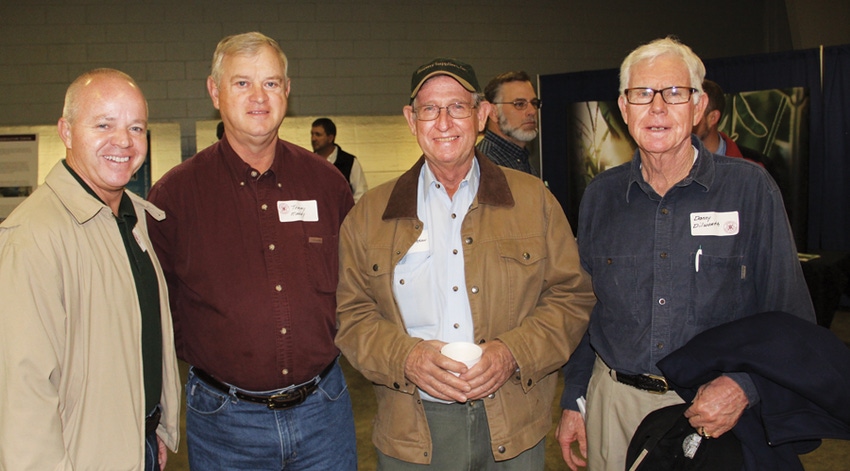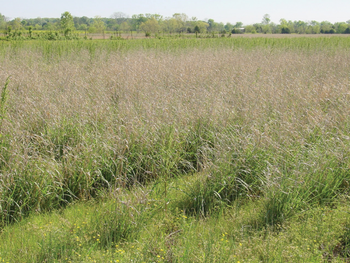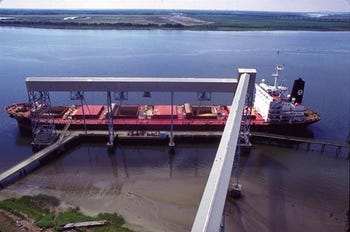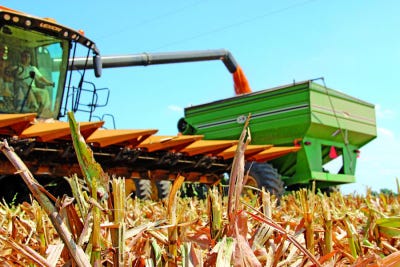
With farm bill done, major issues remain for ag
"One of the challenges we in agriculture face, as people understand less and less about what we do, is maintaining our freedom to operate, and being able to operate as advancing science suggests is the most productive and efficient," says John Anderson, deputy senior economist for the American Farm Bureau Federation. “All this is bound up in the idea of social license: Do people understand what we do? And do they trust us enough to let us do it?"

With the farm bill a done deal except for implementation, other issues remain on the Capitol Hill stove — some getting Congressional attention, says John Anderson, others relegated to the back burners.
Anderson, deputy senior economist for the American Farm Bureau Federation in Washington, spoke at the annual Mississippi State University Producer Advisory Council meeting for north Mississippi farmers.
Among issues with impact for agriculture, he says, are:
Tax reform: “We received word this morning that Rep. Dave Camp, R-Mich., chair of the Ways and Means Committee, will announce a plan for comprehensive tax reform.
“I think everyone recognizes there is a crying need for changes in the tax law and the way we collect taxes. But there are some concerns in the ag community about specific tax reform proposals.”
Among them he says, is elimination of cash accounting for agricultural enterprises. “That would be a really big deal. It would take away a lot of the flexibility in how farmers do their taxes and manage their expenses from year to year.
“The argument on the ag side is that, by virtue of the nature of our businesses, we can have pretty volatile income flows, and cash accounting allows us to smooth that out in a way that’s not terribly disruptive to anyone else. Agriculture is essentially the only industry that’s allowed to use cash accounting, and there’s potential for this to be on the chopping block.”
AG NEWS delivered daily to your inbox: Subscribe to Delta Farm Press Daily
Also in danger, Anderson says, is Section 179 depreciation, an accelerated expensing provision that allows farmers to expense the entire cost of equipment purchases — in some cases, in a single year. “This has been an important tool to help farm businesses manage their tax liability from year to year.
“Tax reform is going to be a very important topic for agriculture over the next few weeks, as these proposals come out, and maybe for the rest of the year.”

"There will be more emphasis on producing renewable fuels from products such as wood waste, grasses, other biomass, methane capture, etc."
Renewable fuels standard: “This is a really detailed, important, and controversial issue,” Anderson says. “The EPA has proposed changing the RFS for 2014 to reduce the amount of renewable fuels below levels in the 2007 Energy Defense and Security Act. They’ll probably put out a final rule before the middle of the year, and until then there will be a lot of back-and-forth discussion of the issue.”
Anderson says he doesn’t think there will be a significant push in Washington to move away from using agricultural crops for renewable fuels production.
“It’s a controversial topic in Washington and all over the country. My personal feeling is that they won’t move away from it, because at this point there are very strongly entrenched interests in that sector, and it would be very disruptive to make a wholesale change. We’ve had success with corn ethanol, and those industries are important in states where they’re established. They don’t want to just jerk the rug out from them.
A more diverse renewable fuels portfolio
“Rather, I think the approach we’re going to see is more an additive approach — a more diverse portfolio of products for renewable fuels generation that complements the use of food crops.
“I think that’s where the focus will be, in terms of dollars,” Anderson says. “In the future, there’ll be more emphasis on producing these fuels from products such as wood waste, grasses, other biomass, methane capture, etc. In other words, let’s don’t destroy what has already been built, but let’s try and add some different things to the mix.”
Immigration reform: “Within agriculture, this is a very big issue because of its implications for farm labor, particularly California and other areas where this labor is critical. It’s a concern for some ag enterprises in Mississippi, and the national ag community is really watching this issue carefully.
“But in this year of mid-term elections, I’m not optimistic anything substantive is going to happen on it. I don’t think there is going to be anyone on either side of the issue with any stomach for doing much on immigration reform. There’ll be a lot of talk about it, but I doubt much will happen.”
Health Care: Implementation of the Affordable Care Act, aka Obamacare, “is going to be an ongoing issue. It seems we lurch from one crisis to another on implementation of this legislation, and in this election year it’s going to remain a topic of much controversy.”
Trade Promotion Authority and ongoing free trade area negotiations are topics “we’ll hear a lot about this year,” Anderson says.

"Trade Promotion Authority and ongoing free trade area negotiations are topics we’ll hear a lot about this year."
The U.S. is negotiating free trade areas within the TransPacific Partnership, which would include Japan. “There’s a lot of interest in the livestock sector in getting this agreement done. For beef and pork interests to have improved access to the Japanese market would be pretty big deal.”
But, Anderson says, “There will be a lot of sticking points on the U.S. side. American sugar interests are very concerned about any deal that would allow more Australian sugar into the U.S., and Japan is very concerned about their rice industry.
“When the various parties started talking up this TransPacific Partnership, everyone said ‘no special deals – everything’s on the table.’ Then as soon as everyone sat down at the table, they started making exceptions. But there is at least some progress being made.”
The other major trade negotiation, Anderson says, is the TransAtlantic Trade and Investment Partnership, a free trade area that “would involve all of Europe and the U.S., the two biggest consumer-spending markets in the world.
“This one,” I think, “is a bit more pie-in-the-sky. There are a lot of major philosophical differences with the Europeans about key issues, such as GMOs, and I think this one will be harder to get done. Nevertheless, we’ll be hearing a lot of about it.”
Challenges from environmental regulations
Environmental regulations: “There will continue to be ongoing challenges to agriculture from environmental regulations — The Clean Water Act, Clean Air Act, Endangered Species Act, etc.,” Anderson says.
In the western and mountain states, the ESA is a hugely important issue for agriculture. In Texas, for example, they can tell you chapter and verse about how much the prairie chicken ESA listing will cost them in terms of agricultural production.
“It’s important to note that, while issues in the West, in Texas, or elsewhere may not directly affect Mid-South agriculture, we need to consider the impact of those models being applied elsewhere.
“I think we’re going to need to devote a lot more attention to the Clean Water Act. For example, what would nutrient standards for the Chesapeake Bay mean for agriculture if the EPA applied the same model to the Mississippi River watershed? That would very directly affect farmers here.
“Implementation of regulations related to the environment is going to become more important to agriculture, and is going to be something we’ll spend a lot of time on in agricultural policy discussions.”
Mid-term elections: Overhanging all these issues, Anderson says, are this year’s mid-term elections. “Many, or all, of these issues may get subsumed by the back-and-forth arguing that goes on relative to the elections. Everything that happens this year in Congress is going to be against the backdrop of these elections, and that will dictate a lot of what gets done or doesn’t get done.”
Agricultural outlook: “I think the outlook for agriculture, in general, is very strong,” Anderson says. “That’s particularly true for livestock in 2014 — there’s every reason to expect overall strong performance in that sector, thanks to lower feed prices and good consumer demand for livestock products.
“China continues to be a big deal for agriculture, more so now that they’re reaching a point where their consumers have more money to spend on higher quality food products. For the livestock sector, that’s a phenomenally supportive development.”

“I think we’ll continue to see pressure building on major row crop prices, particularly grains."
On the crops side, Anderson says, lower commodity prices are likely. “I think we’ll continue to see pressure building on major row crop prices, particularly grains. This is a function of several years of really strong demand, and now supply adjustments have been made.
“That’s how commodity markets work — when you get strong prices, you attract resources into that sector, and supply catches up. We’re kind of at the end of that process now.”
But Anderson says, “I’m finding myself less bearish about grain markets than many other analysts. It’s very early in the year, and there is still a lot of uncertainty about the grain market outlook.
“We’ve already got some production problems developing: the Southern Plains wheat crop is not looking that good, and if we end up with a short crop, that could set a firm tone for grain markets in general. We’ve had a lot of dry weather out west; hopefully, we won’t see that spread, but it’s something to keep an eye on.”
Although it hasn’t got that much attention in agriculture, Anderson says the political unrest and violence in Ukraine need to be watched.
“Ukraine is an important player in both the wheat and corn markets. If their situation destabilizes and they’re basically taken out of export markets, that would leave a hole. It may not be a huge hole, but it would be one that we hadn’t expected to see, and it could affect those markets.”
Growing global demand bodes well for ag
Long-term prospects for the ag sector look “very good,” Anderson says. “We’re going to continue to have growing global demand, with 9 billion mouths to feed by 2050. I don’t think that number is as important as the basic fundamental concept of a growing population and, in a lot of cases, rising incomes in places where people are going to spend more money on improving their diets.
“This backdrop of increasing global demand is very positive for agriculture.”
Technological advancements: Agriculture, Anderson says, is “one of the most technologically advanced sectors of our entire economy. That surprises people outside of agriculture, most of whom still have a fairly antiquated view of agricultural production.
“Ours is a phenomenally advanced sector of the economy, and it’s getting more so all the time. One of the things we’re talking about now is big data, and the application of big data information and techniques to improve agricultural production. Agriculture is going to continue to be on the cutting edge of technology.”
LEARN MORE ABOUT THE FARM BILL: National Cotton Council will host Mid-South meetings
Operational freedom: “One of the things we’ve got to watch,” Anderson says, “and one of the challenges we face, as people understand less and less about what we do, is maintaining our freedom to operate, and being able to operate as advancing science suggests is the most productive and efficient.
“All this is bound up in the idea of social license: Do people understand what we do? And do they trust us enough to let us do it?
“At Farm Bureau, this is something we work on daily, as is the case with our Land Grant universities. We in agriculture do the best we can to do what is scientifically sound, but we need to take a further step and make sure we’re communicating this to the public.
“We need for them to understand what we’re doing, and for them to be on board with us,” Anderson says. “Communicating with consumers is going to be an ongoing challenge for us.”
About the Author(s)
You May Also Like



